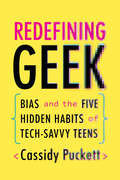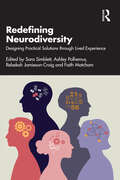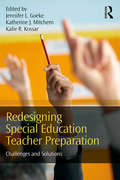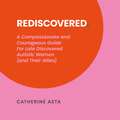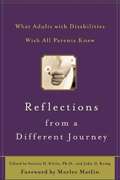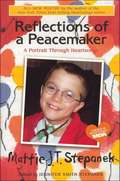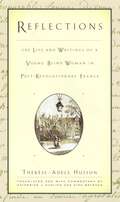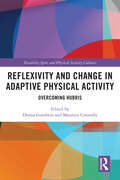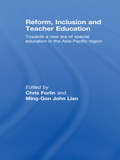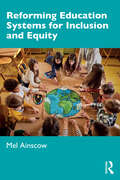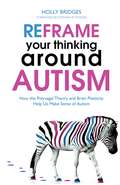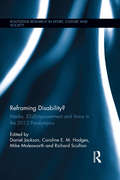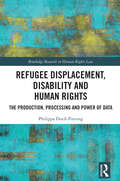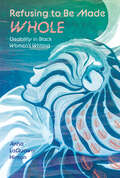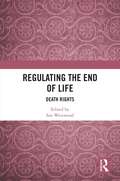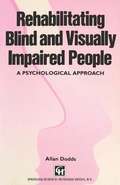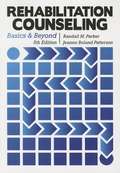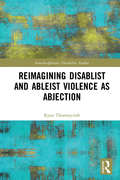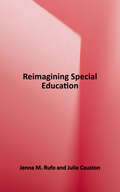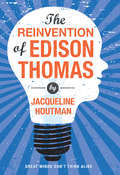- Table View
- List View
Redefining Geek: Bias and the Five Hidden Habits of Tech-Savvy Teens
by Cassidy PuckettA surprising and deeply researched look at how everyone can develop tech fluency by focusing on five easily developed learning habits.Picture a typical computer geek. Likely white, male, and someone you’d say has a “natural instinct” for technology. Yet, after six years teaching technology classes to first-generation, low-income middle school students in Oakland, California, Cassidy Puckett has seen firsthand that being good with technology is not something people are born with—it’s something they learn. In Redefining Geek, she overturns the stereotypes around the digitally savvy and identifies the habits that can help everyone cultivate their inner geek.Drawing on observations and interviews with a diverse group of students around the country, Puckett zeroes in on five technology learning habits that enable tech-savvy teens to learn new technologies: a willingness to try and fail, management of frustration and boredom, use of models, and the abilities to use design logic and identify efficiencies. In Redefining Geek, she shows how to measure and build these habits, and she demonstrates how many teens historically marginalized in STEM are already using these habits and would benefit from recognition for their talent, access to further learning opportunities, and support in career pathways. She argues that if we can develop, recognize, and reward these technological learning habits in all kids—especially girls and historically marginalized racial and ethnic groups—we can address many educational inequities and disparities in STEM.Revealing how being good with technology is not about natural ability but habit and persistence, Redefining Geek speaks to the ongoing conversation on equity in technology education and argues for a more inclusive technology learning experience for all students.
Redefining Neurodiversity: Designing Practical Solutions through Lived Experience
by Sara SimblettRedefining Neurodiversity is a transformative exploration of neurodiversity, redefining how we perceive and engage with cognitive differences. By blending scientific research with personal narratives, this book highlights the lived experiences of neurodivergent individuals - challenging outdated deficit-based models and advocating for inclusive, strength-based approaches.This book brings together voices from a diverse range of neurodivergent individuals, researchers, clinicians, and educators to redefine neurodiversity beyond traditional medical models. It examines neurodevelopmental conditions, acquired neurological differences, and the intersection of mental health and cognitive diversity. Through compelling personal stories, Redefining Neurodiversity highlights the real-world challenges and triumphs of neurodivergent individuals, illustrating how systemic barriers in education, employment, and healthcare can be dismantled. The book provides practical recommendations for fostering inclusive environments where neurodivergent people are not merely accommodated but truly valued. It is a call to shift perspectives - from remediation to empowerment and from exclusion to belonging. The book also has been written in support of The Barbara Wilson Centre CIC, a new organisation that provides services to support people who have neurodiverse needs.This book is an essential read for academics, clinicians, educators, policymakers, industry professionals and anyone seeking to better understand neurodivergence. Whether you are neurodivergent yourself, work alongside neurodivergent individuals, or wish to build a more inclusive society, Redefining Neurodiversity offers insights that are both intellectually rigorous and deeply human.
Redesigning Special Education Teacher Preparation: Challenges and Solutions
by Jennifer L. Goeke Katherine J. Mitchem Kalie R. KossarRedesigning Special Education Teacher Preparation describes both challenges and possible solutions to redesigning and restructuring high-incidence teacher preparation programs so graduates will meet the Highly Qualified Teacher requirements and be prepared to teach students with high-incidence disabilities. This powerful new text discusses many possible reforms, including field-based teacher preparation, a focus on evidence-based core practices and teacher moves, collaboration with K–12 school-based partners as teacher educators, interdisciplinary collaboration across university faculty, and a grounding in current expectations for high-stakes accountability and program evaluation.
Rediscovered: A Compassionate and Courageous Guide For Late Discovered Autistic Women (and Their Allies)
by Catherine AstaMisunderstood your whole life, ashamed, lost, lonely and struggling to cope? Exhausted from trying, but never quite managing, to fit in? Welcome to the Late Discovered Club, home to thousands of late discovered autistic women.Late discovery can be life-changing - a lifetime of mysteries finally making sense. But there can also be a deep accompanying sense of grief. This is a book about coming home to yourself.Catherine's empathetic guidance will help you advocate for yourself with a greater degree of self-awareness. With chapters on everything from masking, mental health, meltdowns, and menopause, to burnout, sensory processing, emotions, relationships, and work - this will help you to nurture your strengths as an autistic woman.You are not alone.
Reducing Barriers to Training of Blind Graduate Students in Psychology
by Heidi JoshiTo increase the number of psychologists with visual impairments, all levels of the pipeline, from graduate training through practica and internship, need to be accessible to this population. This study sought to determine the types of barriers students who are blind face in their psychology graduate programs. The areas explored in the study included accessing printed materials throughout participants' graduate process, administering and scoring test protocols, accessing sources for research, and obtaining campus-wide communications. Attitudinal barriers were also explored in this study, particularly from supervisors, instructors, and peers. There is very little research in this area and as a result, this study was designed to elucidate the experiences of participants with visual impairments in their graduate programs. One goal was to give training institutions a better understanding of the barriers faced by students who are blind. Nineteen participants were interviewed using a semi-structured questionnaire consisting of yes/no and open-ended questions. Descriptive statistics were utilized in order to obtain the major themes of the responses. The most universal barrier related to the plethora of printed material encountered in graduate training. Nearly all of the participants discussed difficulties in obtaining printed material in alternate formats. They especially found it difficult to get enough sources in a timely manner for their research. Participants discussed missing class changes or other important details due to this information being posted in print and not accessible to them. Attitudes were a second barrier frequently encountered. Participants stated that they had to contend with the prejudicial attitudes of supervisors, professors, and peers who were meant to assist them in their process. Participants also discussed their wish to have more disability related awareness and education activities implemented in the curriculum of their graduate institutions. This would assist these institutions in overcoming the attitudinal barriers experienced by their students who were blind. However, participants also discussed supportive factors such as partners and professors who would provide appropriate classroom accommodations. Despite the over thirty years since passage of the rehabilitation act, and the fourteen years since the implementation of the American with Disabilities Act. Results indicate that numerous barriers still exist for graduate psychology students who are blind. These barriers must be aggressively addressed for persons who are blind to be afforded equal access to training in psychology.
Reflections From a Different Journey: What Adults with Disabilities Wish All Parents Knew
by Stanley Klein John D. KempFrom the book: In this book, people with all kinds of disabilities make clear that they can be capable role models for children; advisors to their parents and family members; and teachers to educators, health care professionals, and the many other adults who provide services for children with disabilities and their families. In fact, the essays have important messages for all of us as we strive to make our world a more caring, loving, and peaceful place for all children and families. This book is a wonderful celebration of diversity. The essay writers have grown up with many different kinds of disabilities in many different places, including some countries outside the United States. They are not people who have "overcome" their disabilities. Rather, they have overcome the prejudices of society that all too often stereotype people with disabilities in destructive ways.
Reflections from a Unicorn
by Rick CreechBorn with athetoid cerebral palsy in 1954, Rick Creech was not expected to live six months. Outliving the prediction of his early death, Mr. Creech was not expected to finish school or to attend college, was not expected to leave his or to make a contribution to society. However, in people's expectations, they forgot one variable, Rick Creech. Graduated Magna Cum Laude from East Carolina University in '85, Mr. Creech is an eloquent advocate of independent living and independence through augmented and alternate communicaton.
Reflections of a Peacemaker: A Portrait Through Heartsongs
by Mattie StepanekFinal poems of the award winning, inspiring poet and tributes written for him.
Reflections: The Life and Writings of a Young Blind Woman in Post-Revolutionary France (The History of Disability #5)
by Therese-Adèle HussonIn the 1820s, several years before Braille was invented, Therese-Adele Husson, a young blind woman from provincial France, wrote an audacious manifesto about her life, French society, and her hopes for the future. Through extensive research and scholarly detective work, authors Catherine Kudlick and Zina Weygand have rescued this intriguing woman and the remarkable story of her life and tragic death from obscurity, giving readers a rare look into a world recorded by an unlikely historical figure. Reflections is one of the earliest recorded manifestations of group solidarity among people with the same disability, advocating self-sufficiency and independence on the part of blind people, encouraging education for all blind children, and exploring gender roles for both men and women. Resolutely defying the sense of "otherness" which pervades discourse about the disabled, Husson instead convinces us that that blindness offers a fresh and important perspective on both history and ourselves.In rescuing this important historical account and recreating the life of an obscure but potent figure, Weygand and Kudlick have awakened a perspective that transcends time and which, ultimately, remaps our inherent ideas of physical sensibility.
Reflexivity and Change in Adaptive Physical Activity: Overcoming Hubris (Disability Sport and Physical Activity Cultures)
by Donna Goodwin and Maureen ConnollyThis provocative and challenging book argues for the vital importance of critical self-reflexion in the field of adaptive physical activity (APA). It makes a powerful case for embracing discussions of the harm caused by ableist assumptions of the ideal body, maximizing capabilities and perfecting normativebased movement that dominate contemporary discourse in APA, and calls for more critical introspection about what APA is, how it is performed, and what might be needed to bring a collaborative relational ethic to this field. This book focuses on two key themes: Firstly, how ableism as a foundational belief system of APA is present in the undergraduate curriculum, professional preparation, professional practice, and organizational policies. Secondly, how to make the comfortable uncomfortable by openly debating the harm that results from non-reflexive (nondisabled) hubris in APA. The goal is to spark an exchange of ideas among scholars, practitioners, and organizational leaders and therefore to shift the paradigm from one of professional expertism to one that centres disability wisdom holders, bringing a fundamental change yo how we perform adaptive physical activity. This book is important, progressive reading for anybody with an interest in adaptive physical activity, adapted physical education, disability sport, inclusive education, the philosophy and ethics of disability and sport, or disability in wider society.
Reform, Inclusion and Teacher Education: Towards a New Era of Special Education in the Asia-Pacific Region
by Chris Forlin Ming-Gon John LianThis ground-breaking book considers current perspectives on special education reform in the Asia-Pacific region. It has a major focus on a new era of special education, and how this relates to education reform towards inclusive education. With major changes being proposed under current educational reform and confusion as to how to instigate these measures, this book provides ways to better prepare teachers. It is helpfully divided into three different sections of education reform: "Education Reform in the Asia-Pacific region" reviews broad trends and issues in special education across the region, including Taiwan, Korea, Australia, India, China and Hong Kong. "Preparing Teachers to work in Inclusive Classrooms" focuses on curricula and pedagogical practices for teacher education. This section considers different approaches to preparing teachers such as cross-categorical, collaborative, innovations, and the impact of teachers’ attitudes, perceptions and concerns on inclusion. "Effective Special & Inclusive Practices" draws upon evidence–based research to provide best practice models to assist in developing inclusive school communities. Each section addresses a list of objectives and questions; suggests best practice pedagogy; and concludes with a support section with useful websites and suggested professional development activities. This book will interest teachers, teacher educators, university lecturers in education and post graduate students.
Reforming Education Systems for Inclusion and Equity
by Mel AinscowReforming Education Systems for Inclusion and Equity addresses the universal challenge of developing forms of education that make a difference for all children and young people, no matter their characteristics or backgrounds. From renowned author Mel Ainscow, this impactful book offers guidance for developing, implementing, and monitoring policies for inclusion and equity in education systems. Drawing from the author’s extensive work across the globe as well as from international research contributions and literature in the field, Ainscow presents a framework to plan a strategy for reform, featuring six key ideas: centre inclusion and equity in educational policies; identify and address contextual barriers; support and encourage the development of all members of the learning environment; strengthen networking amongst schools; engage family and community partners; provide challenge and support locally. This exciting new book is written for school and system leaders, district administrators, community partners, and policy-makers.
Reframe Your Thinking Around Autism: How the Polyvagal Theory and Brain Plasticity Help Us Make Sense of Autism
by Holly BridgesOutlining a new, optimistic way to understand autism, this concise and accessible book offers practical ideas to help children on the spectrum grow. The Polyvagal Theory suggests autism is a learnt response by the body - a result of the child being in a prolonged state of 'fight or flight' while their nervous system is still developing. This book explains the theory in simple terms and incorporates recent developments in brain plasticity research (the capacity of the brain to change throughout life) to give parents and professionals the tools to strengthen the child's brain-body connection and lessen the social and emotional impact of autism.
Reframing Disability?: Media, (Dis)Empowerment, and Voice in the 2012 Paralympics (Routledge Research in Sport, Culture and Society #41)
by Daniel Jackson Caroline E.M. Hodges Mike Molesworth Richard ScullionThe London 2012 Paralympic Games - the biggest, most accessible and best-attended games in the Paralympics' 64-year history - came with an explicit aim to "transform the perception of disabled people in society," and use sport to contribute to "a better world for all people with a disability." This social agenda offered the potential to re-frame disability; to symbolically challenge "ableist" ideology and to offer a reinvention of the (dis)abled body and a redefinition of the possible. This edited collection investigates what has and is happening in relation to these ambitions. The book is structured around three key questions: 1. What were the predominant mediated narratives surrounding the Paralympics, and what are the associated meanings attached to them? 2. How were the Paralympics experienced by media audiences (both disabled and non-disabled)? 3. To what extent did the 2012 Paralympics inspire social change? Each section of this book is interspersed with authentic "voices" from outside academia: broadcasters, athletes and disabled schoolchildren.
Refugee Displacement, Disability and Human Rights: The Production, Processing and Power of Data (Routledge Research in Human Rights Law)
by Philippa Duell-PieningThis book presents a timely and innovative exploration of one of the first human rights articles about data production and processing: the Convention on the Rights of Persons with Disabilities article 31, ‘Statistics and data collection’.The study provides detailed explorations of the legal and practical demands of article 31, how these have been interpreted and the practice of human rights research with marginalised communities. It describes the history of the article’s drafting in detail, uncovering the tensions at its heart today. This analysis provides the foundations for an alternative doctrinal reading of the obligations in article 31 and an exploration of a potential group right. The book's detailed analysis is assisted by a new conceptual framework that illustrates the relationship between visibility and power. The work demonstrates that data is not inert but powerful and may be used in ways that are helpful and harmful to rights holders. Through closely examining disability human rights data practices in refugee contexts, it concludes that human rights protections are being ignored in the urgency to create more data to identify and address inequality. The author identifies immediate actions that may be taken to remediate current practices.The book will be an invaluable resource for academics, researchers and policy-makers working in disability studies, human rights law, refugee and migration studies, technology and society.
Refusing to Be Made Whole: Disability in Black Women's Writing (Margaret Walker Alexander Series in African American Studies)
by Anna LaQuawn HintonIn Refusing to Be Made Whole: Disability in Black Women’s Writing, author Anna LaQuawn Hinton examines how contemporary Black women writers present becoming disabled as a traumatic and violent experience of Black womanhood. Nevertheless, Black women embrace disabled Black womanhood by turning to Africanist spiritual understandings of wholeness, which view debilitating injury and illness as not only physical but also spiritual, not just an individual problem but a symptom of discord in the community. Black women use these belief systems to reimagine healing in ways that make space for a variety of bodymindspirits. Hinton maintains that this is not only a major theme in contemporary Black women’s writing but that it also shapes the formal elements characteristic of the Black women’s literary tradition. Refusing to Be Made Whole analyzes texts published after the civil rights movements of the 1950s and 1960s, focusing particularly on the late 1970s onward when Black women’s writing flourished. Through the lens of writings by authors such as Toni Cade Bambara, Gayl Jones, Gloria Naylor, Ntozake Shange, Audre Lorde, Alice Walker, Toni Morrison, Octavia Butler, Sapphire, and Sarah E. Wright, Hinton addresses prominent critical discourses within Black feminist literary studies. Hinton approaches the intersections of Africanist spirituality, race, gender, class, and disability, conversations about representation, community, motherhood, and sexuality through a Black feminist disability studies framework. Refusing to Be Made Whole embraces the complex and multifaceted nature of Black women’s writing, arguing that through this collision of race, gender, and spirituality, Black women writers speak healing and wellness into their readers’ lives and their own.
Regulating the End of Life: Death Rights
by Sue WestwoodDeath Rights is a collection of cutting-edge chapters on assisted dying and euthanasia, written by leading authors in the field. Providing an overview of current regulation on assisted dying and euthanasia, both in the UK and internationally, this book also addresses the associated debates on ethical, moral and rights issues. It considers whether, just as there is a right to life, there should also be a right to death, especially in the context of unbearable human suffering. The unintended consequences of prohibitions on assisted dying and euthanasia are explored, and the argument put forward that knowing one can choose when and how one dies can be life-extending, rather than life-limiting. Key critiques from feminist and disability studies are addressed. The overarching theme of the collection is that death is an embodied right which we should be entitled to exercise, with appropriate safeguards, as and when we choose. Making a novel contribution to the debate on assisted dying, this interdisciplinary book will appeal to those with relevant interests in law, socio-legal studies, applied ethics, medical ethics, politics, philosophy, and sociology.
Rehabilitating Blind and Visually Impaired People: A Psychological Approach
by Allan DoddsDrawing on examples from a range of sensory and physical disabilities, this book emphasizes the importance of treating people individually, based on consideration of their psychological strengths and weaknesses as well as physical functioning. Written for workers with visually impaired people, this book is equally accessible to students and qualified workers, including rehabilitation workers, O & M specialists, occupational therapists, social workers and psychologists. Students and workers should find the language easy to understand and largely non-technical.
Rehabilitation Consultant's Handbook
by Roger O. Weed Timothy F. FieldThe Rehabilitation Consultants Handbook is completely updated with fresh ideas, illustrations and references. A must resource for the present rehabilitation professional, the Handbook covers important topics such as: case preparation, expert work, transferability, labor market access, life care planning, lost earning capacity, and much more. The appendices are loaded with vital references and data that will serve the professional as a primary source of information in future case development. This resource has been revised and updated over the last 18 years and has become a standard reference for private sector rehabilitation.
Rehabilitation Counseling: Basics And Beyond
by Randall M. Parker Jeanne Boland PattersonThe purpose of this text is to provide both a basic foundation for students beginning their journey into the profession of rehabilitation counseling and a broad-based reference for current practitioners. The contents provide a conceptual overview of the profession, history, theory, research, and applied foundations of rehabilitation counseling.
Rehabilitation Teaching For Persons Experiencing Vision Loss
by Wilma Inkster Linda Newman Diane Storm-Weiss Anne YeadonThis textbook intended for Rehab. Professionals outlines in sequential steps and objectives tasks of daily living and Independent completion of tasks from cooking and kitchen safety, to clothing care, to applying cosmetics.
Reimagining Disablist and Ableist Violence as Abjection (Interdisciplinary Disability Studies)
by Ryan ThorneycroftDrawing upon vivid and harrowing life history narratives of people labelled intellectually disabled, this book examines the ways in which disabled subjects are constituted, regulated, governed, and violated through an account of abjection. Extending interdisciplinary dialogues and approaches, it abandons a construct of violence (which by law requires a stable notion of a victim and a perpetrator) and moves to a theorisation of abjection to explore the ways in which disabled subjects are (re)produced, constituted, and treated through time. Deploying a wide range of interdisciplinary approaches, this book sits at the intersections of criminology and sociology, re-thinks notions of dis/ability, violence, and subjectivity, and utilises crip and queer theory to imagine dis/ability differently. It will be of interest to all scholars and students of disability studies, sociology and criminology, and specifically those working the areas of life history work, post-structuralism, hate crime, and post-modern criminology.
Reimagining Special Education: Using Inclusion as a Framework to Build Equity and Support all Students
by Jenna Mancini Rufo Julie CaustonAs schools reopen their doors and students return to the classroom, what will the “new normal” of special education look like? The pandemic exposed educational inequities and areas of urgent need—and now, schools have a unique opportunity to press pause and reimagine their practices. This book helps K–12 school leaders and educators take the lessons of the COVID-19 era and turn them into action: by closely examining what worked during distance learning, letting go of practices that keep some students struggling, and planning new routines and environments that meet the needs of every learner. <p><p>A visionary call to action from inclusion experts Jenna Mancini Rufo and Julie Causton, Reimagining Special Education guides readers in creating more equitable schools and services, through practical strategies teachers can use right away and thought-provoking, big-picture questions for administrators to tackle. Readers will explore how inclusive educational practices can address each student’s unique needs as schools reopen and bridge learning gaps for students who struggle. Throughout the book, vignettes and anecdotes spark lightbulb moments for educators and show what recommended practices look like in real classrooms. <p><p>Essential reading for administrators, classroom teachers, and other education professionals, this is the forward-thinking guide every school needs to reimagine the possibilities for special education, support authentic inclusion, and help learners with and without disabilities thrive in a changing world.
Reinvention of Edison Thomas, The
by Jacqueline HoutmanEddy's a science geek and has problems communicating with others. The combination gives the class bully, who pretends to be Eddy's friend, plenty of ammunition. Eddy Thomas can read a college physics book, but he can't read the emotions on the faces of his classmates. He can spend hours tinkering with an invention, but he can't stand more than a few minutes in a noisy crowd, like the crowd at the science fair, which Eddy fails to win. When the local school crossing guard is laid off, Eddy is haunted by thoughts of the potentially disastrous consequences and invents a traffic-calming device, using parts he has scavenged from discarded machines. By trusting his real friends, Eddy uses his talents to help others and rethinks his purely mechanical definition of success.Named to the Kansas State Reading Circle Recommended Reading List; CCBC--Best of the Year; Tofte/Wright Children's Literature Award; starred review in Library Media Connection.
Relationship, Responsibility, And Regulation: Trauma-invested Practices For Fostering Resilient Learners
by Pete Hall Kristin Van MarterIn this stirring follow-up to the award-winning Fostering Resilient Learners, Kristin Van Marter Souers and Pete Hall take you to the next level of trauma-invested practice. To get there, they explain, educators need to build a ""nest""—a positive learning environment shaped by three new Rs of education: relationship, responsibility, and regulation. Drawing from their extensive experience working with schools, students, and families throughout the country, the authors Explain how to create a culture of safety in which everyone feels valued, important, and capable of learning. Describe the four areas of need—emotional, relational, physical, and control—that drive student behaviors and show how to meet these needs with interventions framed around the new three Rs. Illustrate trauma-invested practices in action through real scenarios that identify students' unmet needs, examine the situation from five stakeholder perspectives, and suggest interventions to support students and their families. Offer opportunities to challenge your beliefs and develop deeper and different ways of thinking about your role in your students' lives. Educators have a unique opportunity to influence students' learning, attitudes, and futures. This book will invigorate your practice and equip you to empower those you serve—whatever their personal histories.
